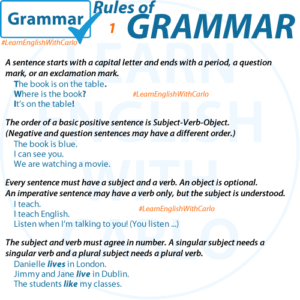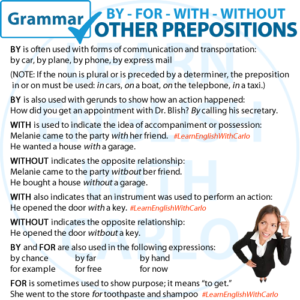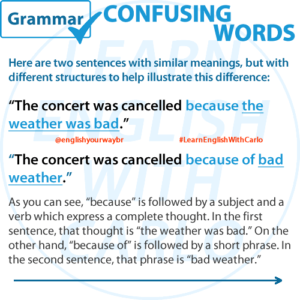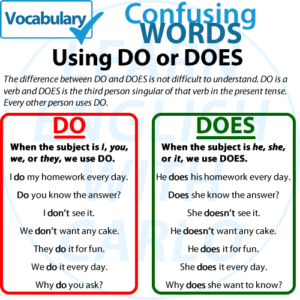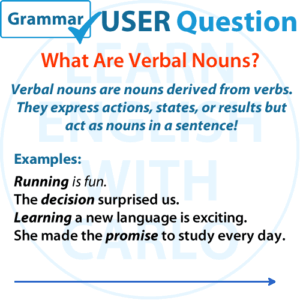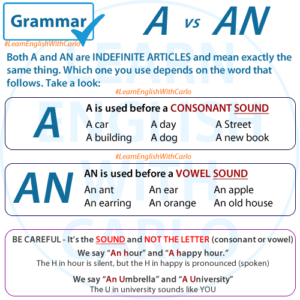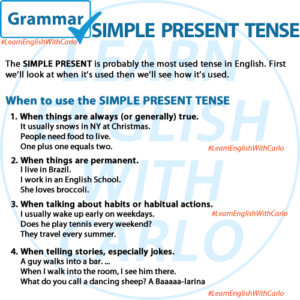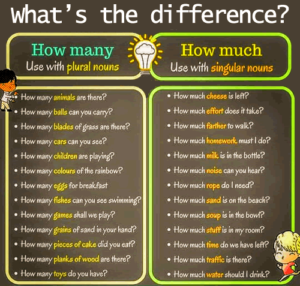Mastering English grammar helps you communicate clearly and naturally. Here’s a guide to some fundamental rules, complete with examples and exceptions to be aware of. 1. Indefinite Articles (A/An) 2. Countable and Uncountable Nouns with Quantifiers 3. Possessive Form with Apostrophes 4. Active vs. Passive Voice 5. Contractions: ‘He’d’, ‘They’d’, and More 6. Proper Nouns …
Category: GRAMMAR
Permanent link to this article: https://englishyourway.com.br/essential-english-grammar-rules-for-esl-learners/
Dec 19
OTHER PREPOSITIONS
By is often used with forms of communication and transportation:by car, by plane, by phone, by express mail (‘Note: If the noun is plural or is preceded by a determiner, the preposition in or on must be used: in cars, on a boat, on tbe telepbone, in a taxi.) By is also used with gerunds …
Permanent link to this article: https://englishyourway.com.br/other-prepositions/
Dec 18
“Because” vs. “Because of”
What’s the difference between “because” and “because of”? In most cases, “because” is followed by a subject and a verb, and “because of” is typically followed by a single word or phrase. Here are two sentences with similar meanings, but with different structures to help illustrate this difference: “The concert was canceled because the weather …
Permanent link to this article: https://englishyourway.com.br/because-vs-because-of/
Dec 16
CONFUSING WORDS – DO vs. DOES
The difference between DO and DOES is not difficult to understand.DO is a verb and DOES is the third person singular of that verb in the present tense. Every other person in the conjugation uses DO. When the subject is I, you, we, or they, we use DO. I do my homework every day.Do you …
Permanent link to this article: https://englishyourway.com.br/confusing-words-do-vs-does/
Dec 12
GRAMMAR – Verbal Nouns
What Are Verbal Nouns and How Are They Constructed? If you’ve ever encountered words like running, development, or decision, you’ve seen verbal nouns in action! Verbal nouns are a fascinating aspect of English grammar, as they combine the essence of an action (from verbs) with the grammatical function of a noun. Let’s dive into what …
Permanent link to this article: https://englishyourway.com.br/grammar-verbal-nouns/
Dec 11
A vs. AN: Indefinite Articles
Both A and AN are indefinite articles in English, and they mean exactly the same thing. They are used before singular, countable nouns when you are not referring to a specific item. However, the choice between A and AN depends entirely on the sound of the word that follows—not necessarily the first letter of that …
Permanent link to this article: https://englishyourway.com.br/a-vs-an-indefinite-articles/
Dec 02
Giving Advice: SHOULD, OUGHT TO, and HAD BETTER
When giving advice in English, we often use the modal verbs “should,” “ought to,” and “had better.” Each of these has its nuances and specific contexts where they are more appropriate. Let’s explore how to use them, their differences, and how they work in questions and negative sentences. Using SHOULD “Should” is the most common …
Permanent link to this article: https://englishyourway.com.br/giving-advice-using-should-ought-to-had-better/
Dec 01
GRAMMAR – SIMPLE PRESENT TENSE
The SIMPLE PRESENT is probably the most used tense in English. First, we’ll look at when it’s used then we’ll see how it’s used. When to use the SIMPLE PRESENT TENSE 1. When things are always (or generally) true.It usually snows in NY at Christmas.People need food to live.One plus one equals two. 2. When …
Permanent link to this article: https://englishyourway.com.br/grammar-simple-present-tense-2/
Nov 23
SO-SO and MORE OR LESS: What’s the Difference
While SO-SO and MORE OR LESS are short and simple phrases, they serve entirely different purposes in English. Let’s dive into their meanings, uses, and nuances. 1. SO-SO: The Language of the Average Definition:SO-SO is used to describe something that is average, ordinary, or not impressive. It conveys a neutral feeling—not good, not bad. When …
Permanent link to this article: https://englishyourway.com.br/difference-between-so-so-and-more-or-less/
Nov 20
GRAMMAR – How Much vs. How Many
When we want to know the quantity or amount of something, we use HOW MUCH or HOW MANY. Key Differences: Remembering this distinction will help you use “how much” and “how many” correctly in questions and statements based on whether the noun is countable or uncountable. If you have any questions or doubts, please ask …
Permanent link to this article: https://englishyourway.com.br/difference-between-how-much-and-how-many/

